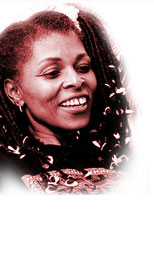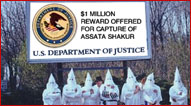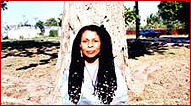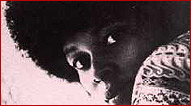


Search Site
|

|
Prisoner in Paradise An Interview with Assata Shakur by Evelyn C. White (Originally published in Essence Magazine in 90s) As Assata Shakur writes in her poetic 1987 memoir, "Assata: An Autobiography," her name means "she who struggles" and the "the thankful." Although she has been exiled in Cuba for nearly two decades, the former JoAnne Chesimard continues to fight by speaking out against inequality and oppression. Our conversation took place on a sun-drenched afternoon in Havana. With her glistening dreadlocks hanging to mid-spine, Assata came wearing mauve-colored cotton shorts and a beige T-shirt with a black design. Around her long elegant neck was a golden Ankh, the ancient Egyptian symbol of life. On her feet, she wore a pair of Asics sneakers-the shoes that cushion her stride as she jogs through the streets of the palm lined island that has become her home. "Yes, we see her running," Cuban children respond gleefully when asked about Assata. "Ella es muy hermosa (She is very beautiful)." Beautiful, that is not what the feds thought in 1977 when Assata was convicted of being the accomplice to the murder of a White New Jersey state trooper. During the 1973 shoot-out, in which the officer and Black activist Zayd Shakur (no relation) were slain, Assata Shakur took two bullets. One nearly ripped off her right arm. The other shattered her clavicle and remains lodged near her heart. The all-White jury gave short shrift to forensics experts who testified that Assata massive injuries could have only been sustained while her hands were in a position of surrender. They ignored the absence of gun residue on her fingers-there was no evidence she had fired a weapon. She was sentenced to life imprisonment plus 30 years ("for refusing to stand when the judge read the sentence" Assata explains). Two years after her conviction, Assata masterminded one of the most daring prison escapes in U.S. History. Noting that details about her escape could be detrimental to people who are currently incarcerated, Assata declined to elaborate on exactly how she slipped out of the maximum security wing of the Clinton Correctional Facility for Women in New Jersey in 1979. She is similarly reticent about the years she spent underground before being granted political asylum in Cuba in the early eighties. On the topic of her escape, she simply offers these words with determination and pride: "I was like Houdini. I plotted day and night. There was no way I was going to spend the rest of my life in prison for something I didn't do." What do you want people to know about your life now? Assata Shakur: I'm still very active in political work. I'm putting finishing touches on another book. I talk about gender relations, Rap music, crime and so forth, in a question-and-answer format. I ask my own question and then answer myself (laughs) so the book is a bit shizy. But it's the form that I thought would best get across the points I want to make. What has life been like for you in Cuba? It's been good. It was hard at the beginning because I had to adjust to another culture and learn another language. I had to adjust to living in a Third World country, which means that things people in the U.S. take for granted-like hot running water whenever you turn on the tap-are not always available here. But it's been a growing and happy experience for me in many ways. Another thing I've been able to do in Cuba is rest. You live such an intense life in the States. And my life has been more intense than most (laughs). Being in Cuba has allowed me to live in a society that is not at war with itself. There is a sense of community. It's a given in Cuba that, if you fall down, the person next to you is going to help you get up. How do you relax? I run. I live here on an island surrounded by all this water and I'm a lousy swimmer (laughs). It's pitiful. I've started to crochet again, which is something I learned in prison. I'm going to be a grandmother soon, so with the crochet, I can make gifts for my daughter and the baby. I'm totally into this grandmother thing. I'm starting to paint and write fiction. I'm in a more creative stage of life. There's something about approaching 50 that's very liberating. Political struggle has always been a 24-hour-a-day job for me. I felt I could never take time out for myself. Now I feel I owe it to myself to develop in ways I've been putting off all my life. I'm crafting a vision of my life that involves creativity. And Cuban society allows me to do this. I know it's harder in the U.S. where so many people are just grateful to have a job. What types of jobs have you had in Cuba? I've worked in different study centers as a translator. But I've tried as much as possible to avoid the standard nine-to-five thing. I've tried to organize my life so that I can move around, change the rhythm and the tempo. I'm invited to give lots of presentations to people who come here. I talk about human-rights violations and political prisoners in the United States. Do the Cuban people know your life story? No, the average Cuban does not. And I really prefer to be kind of anonymous. Because when people know your whole history, they have a tendency to relate to you differently and maybe put you up on a pedestal. I want people to just be normal with me. I just want to live my life. When Cubans ask about your background how do you respond? I tell the truth. I say I'm a political prisoner from the United States who is living here in exile. That's not uncommon. There are many people here from Chile, Guatemala, Nicaragua, El Salvador and other places who have been granted political asylum. Cubans understand that theirs is a country that provides sanctuary for people fleeing oppression. As a nation, they are very proud of this stance. They don't care how much the U.S. government badgers or attacks them. Cuba has its own moral system and priorities. That's what keeps it going, the belief that the country can control its own destiny. Is there anything you've discovered about yourself that has surprised you since coming to Cuba? Becoming aware of my own vulnerability and sensitivity and being able to express those feelings has been a surprise. In the States, I always had to be tough and ready to take care of business. Here I can look at sides of me that are more delicate and fragile. That was kind of a shock to me. I think that, like many sisters, I was raised to be a Superwoman. I am a serious woman, and I want to be taken seriously, but here I don't have to live up to that Superwoman myth. I can cry and be human and lean on people who take care of me. That can be very liberating. What do you think will happen to you if Fidel Castro is overthrown? If the U.S. succeeds in destroying the revolution, my status will be like that of most Cubans: I'll be up a creek without a paddle. It will be devastating for people worldwide who believe in justice. It's a threat I live with every day, because the U.S. doesn't recognize the laws of Cuba. They can kidnap anybody and bring them back to the States to face the so-called justice system. There's no telling what the U.S. government will do to me. I'm in constant danger; I guess I've gotten used to it. How do you mange to stay connected with the United States? I stay connected in my head. I'm spiritually and psychologically connected to African-Americans. They are my people, and that will never change. And I'm truly blessed, because many of my friends come to Cuba. They like it here-they can relax and not worry about drive-by shootings or getting raped. I meet all kinds of people. I'm a news freak; I read books, magazine, listen to tapes, anything I get my hands on. And a lot of contemporary American culture makes its way to this county. Cuba is not some gray, isolated backwater. This is a happening place. Do you think you will ever return home? I don't know. I think it will be hard. It's funny. People ask me if I miss the States. I miss African Americans. But not the U.S. government or all the things they put me through. I miss African American culture, our speech, dance and cooking. I miss friends and family. If it weren't for visits from old friends and other African Americans I meet who come to Cuba, I'd probably be in some kind of time warp. I learn so much from my sisters and brothers who come here. I get recharged and energized and reminded of how beautiful we are as a people. African people just shine. And people come telling the truth. When I ask how thing are in the States, they don't give me the okeydoke. They say, "Honey, things are hard." It reminds me I have to keep struggling. |



